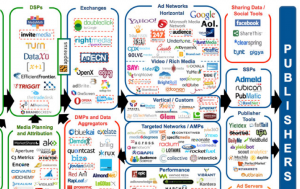What technical, operational and campaign performance [bidder] KPI’s should be considered when ramping up, and are there any industry benchmarks?
This question was asked on quora, below is my answer.
 From a technical perspective you’ll want to measure how many different types of inventory you support: mobile, app, web, video, facebook ads etc… You’ll want to track how many SSPs you’re integrated with and how many impressions are available to you. You should look into creating a feature matrix and decide which advertising features you and your customers find most important.
From a technical perspective you’ll want to measure how many different types of inventory you support: mobile, app, web, video, facebook ads etc… You’ll want to track how many SSPs you’re integrated with and how many impressions are available to you. You should look into creating a feature matrix and decide which advertising features you and your customers find most important.
On the operations side you’ll want to make sure your bidding system is responding to bid requests quickly. The round-trip time for a bid response, from an SSPs perspective, should be no more than 100ms – and even that is pushing it these days. Your internal bidding algorithm should probably make a decision in less than 30 or 40ms. This allows about 60ms for network latency between the bidder and the SSP. Some SSPs have DSP latency monitoring available. This type of monitoring will give you insight into what the SSP is seeing. Read more





 Mature Demand Side Platforms (DSPs) have conquered the primary requirements to being in business in the online ad space, including: campaign pacing, optimization of bids, campaign goals and budget allocations. The old guard is now well established. New DSPs, presumably with novel approaches to the market, may encounter some of these basic challenges. There are a lot of examples they can look at in the market for guidance.
Mature Demand Side Platforms (DSPs) have conquered the primary requirements to being in business in the online ad space, including: campaign pacing, optimization of bids, campaign goals and budget allocations. The old guard is now well established. New DSPs, presumably with novel approaches to the market, may encounter some of these basic challenges. There are a lot of examples they can look at in the market for guidance. 
